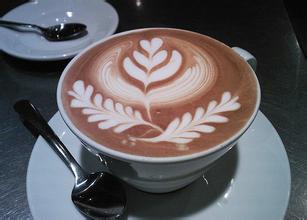Introduction to the characteristics of Flavor and Taste varieties in Brazilian Coffee Manor areas that are familiar to the public
China Coffee Network Grinding: in order to blend with water, coffee has made the greatest sacrifice-smashing to pieces. Before brewing coffee, the beans must be ground into fine grains to increase the contact area between water and coffee in order to extract the delicacy. In fact, the bean grinder is more important than the coffee machine. At present, most people choose the "sawtooth grinder" because it can grind uniform coffee powder quickly and steadily. The operation method of the sawtooth bean grinder is very simple, generally speaking, it will have two setting functions, one is to set the grinding degree, the other is to set the grinding time. The degree of grinding is mostly expressed in Arabic numerals, and the smaller the number is, the finer the grinding is. On the top of the bean grinder is a funnel shaped box containing unground beans, and below is a drawer to hold the ground coffee powder. When you choose to buy a bean grinder, you should pay attention to its power, usually between 70 watts and 150 watts, the higher the better, the higher the power, the faster the grinding speed, and the shorter time the coffee powder stays in the sawtooth. Brazilian coffee, which can grind coffee powder at a low temperature, generally refers to coffee produced in Brazil. There are many kinds of coffee in Brazil, and like other Arabian coffee, Brazilian coffee is called
Brazil Coffee
Brazil Coffee
"Brazils" to distinguish it from "Milds" coffee. The vast majority of Brazilian coffee is unwashed and sun-dried and is classified according to the name of the state of origin and port of transport. Brazil has 21 states, 17 of which produce coffee, but four of them produce the largest, accounting for 98 per cent of Brazil's total output: Parana, SaoPaulo, MinasGerais and EspiritoSanto, with the southern state producing the most, accounting for 50 per cent of total production.
Low acidity, moderately roasted coffee beans from the World Coffee Center.
Brazil is vividly compared to the "giant" and "monarch" of the coffee world. There are about 3.97 billion coffee trees there, and small farmers now grow 75% of Brazil's total coffee production. The number of people engaged in coffee production in Brazil is two or even three times that of Colombia, which is the world's second largest coffee producer, accounting for 1/3 of global coffee consumption. it has a place in the global coffee market, although Brazil faces several times higher natural disasters than other regions, but its acreage is enough to make up for it.
Brazilian coffee fruit
Brazilian coffee fruit
There are many kinds of coffee here, but its industrial policy is large and cheap, so there is not much premium coffee, but it is a good choice for mixing other coffees.
One of the most famous is Sandos Coffee, which tastes mellow and neutral. It can be boiled directly or mixed with other kinds of coffee beans to form a comprehensive coffee. It is also a good choice.
Other kinds of Brazilian coffee, such as Rio and Parana, can be produced in large quantities because they do not require too much care. Although the taste is rough, it is a kind of high-quality and inexpensive coffee, which has its own standards because it is distributed all over Brazil and varies in quality (NO.2~NO.8 according to the number of sundries, NO.13~NO.19 according to the size of beans, and six grades according to taste). Almost all Arabica varieties are of good quality and stable in price. The most famous one is "Brazil Santos", which has been a necessity of blended coffee and is familiar to the public since ancient times. Recently, the rating of "Guilma Cup" is also very high.

Important Notice :
前街咖啡 FrontStreet Coffee has moved to new addredd:
FrontStreet Coffee Address: 315,Donghua East Road,GuangZhou
Tel:020 38364473
- Prev

Introduction to the flavor and taste characteristics of Nicaraguan coffee with mild and delicious, moderate granules
The excellent Nicaraguan coffee is among the highest in the world, it is mild and delicious, moderate granule, very fragrant. In many countries, coffee production has been seriously affected for political reasons. Nicaraguan coffee industry is no exception. The 1979 revolution forced coffee planters to flee to Miami. It was followed by a period of uncertainty, and the government considered whether to re-divide it.
- Next

Introduction to the characteristics of aromatic and rich flavor varieties in Kenyan coffee manor
Aromatic, full-bodied, with fruit flavor, taste rich and perfect. Kenyan coffee has a wonderful fruit flavor, tastes like BlackBerry and grapefruit, and is a favorite of many coffee gluttons. This coffee has an excellent medium purity, crisp and refreshing taste. It has a fresh flavor and is most suitable for drinking iced coffee in summer. When tasting this coffee, if served with pomelo
Related
- Detailed explanation of Jadeite planting Land in Panamanian Jadeite Manor introduction to the grading system of Jadeite competitive bidding, Red bid, Green bid and Rose Summer
- Story of Coffee planting in Brenka region of Costa Rica Stonehenge Manor anaerobic heavy honey treatment of flavor mouth
- What's on the barrel of Blue Mountain Coffee beans?
- Can American coffee also pull flowers? How to use hot American style to pull out a good-looking pattern?
- Can you make a cold extract with coffee beans? What is the right proportion for cold-extracted coffee formula?
- Indonesian PWN Gold Mandrine Coffee Origin Features Flavor How to Chong? Mandolin coffee is American.
- A brief introduction to the flavor characteristics of Brazilian yellow bourbon coffee beans
- What is the effect of different water quality on the flavor of cold-extracted coffee? What kind of water is best for brewing coffee?
- Why do you think of Rose Summer whenever you mention Panamanian coffee?
- Introduction to the characteristics of authentic blue mountain coffee bean producing areas? What is the CIB Coffee Authority in Jamaica?

